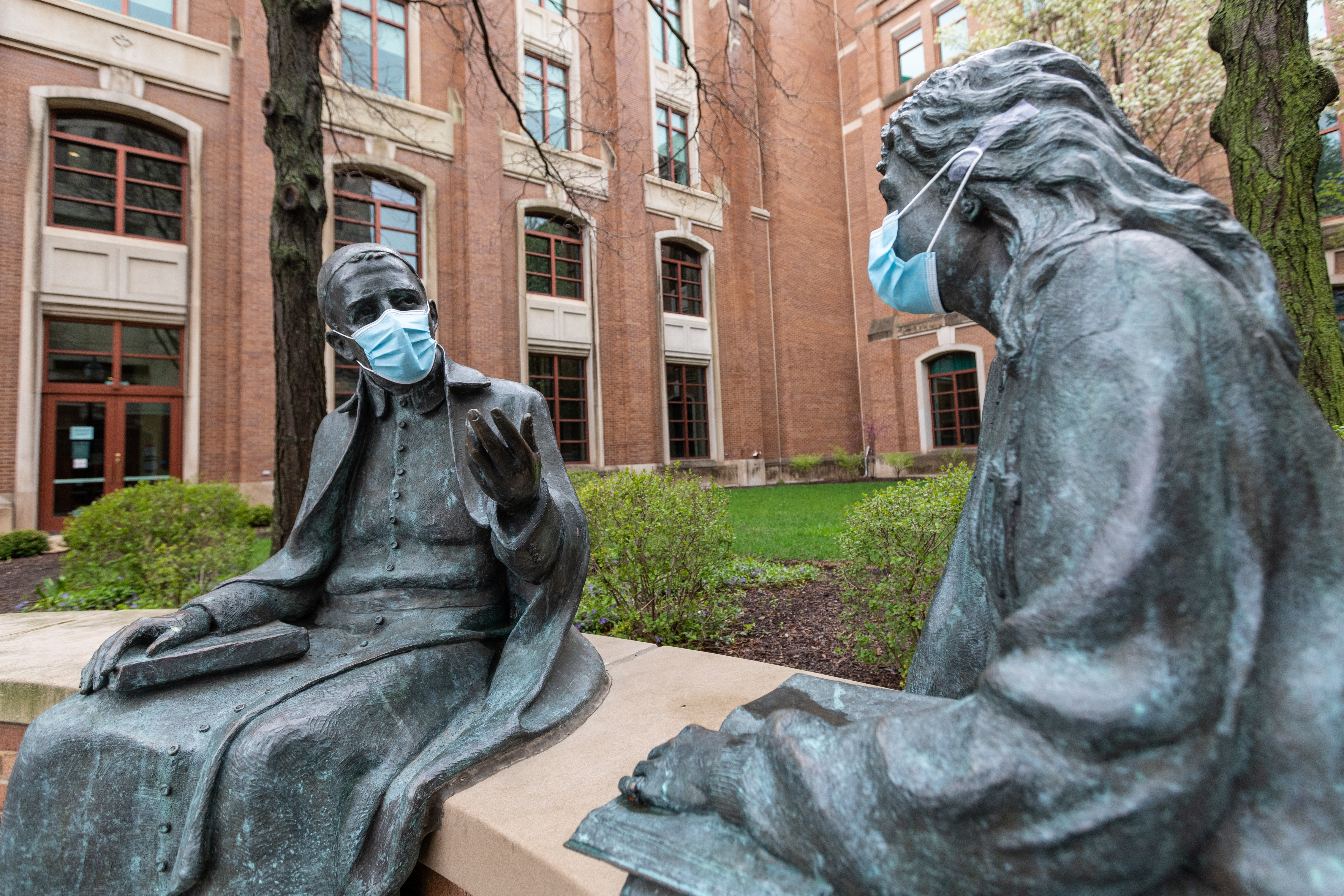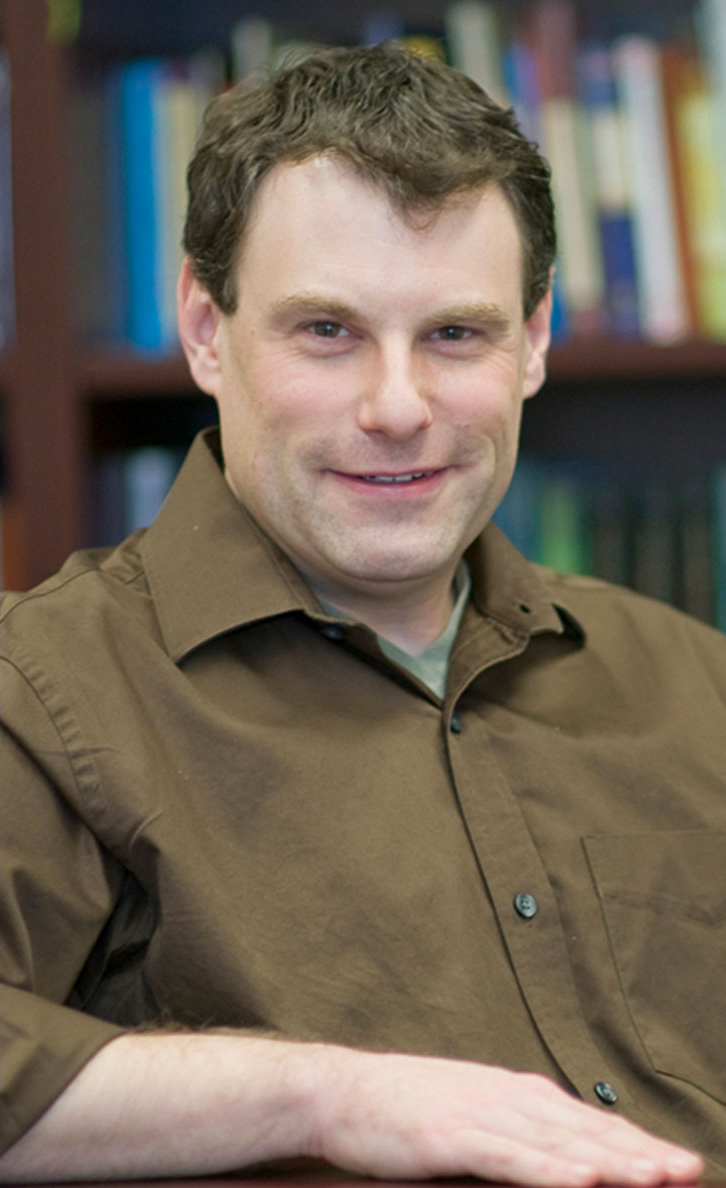 (DePaul University/Jeff Carrion)
(DePaul University/Jeff Carrion)
Craig Klugman, professor of bioethics and health humanities in the College of Science and Health, has been involved with DePaul’s COVID-19 response efforts since the university moved courses and most operations online in the spring. He continues to serve as a member of the Restarting Campus Operations Task Force, where he lends his expertise to the group’s decisions and advises committees related to community health, treatment and monitoring in the leadup to the start of the fall quarter.
 Craig Klugman, a professor of bioethics and health humanities in the College of Science and Health.
Craig Klugman, a professor of bioethics and health humanities in the College of Science and Health.
DePaul is requiring students, faculty and staff to use the
#CampusClear app to screen for COVID-19 symptoms before they visit campus. In this interview, he shares some of his thoughts with Newsline on DePaul’s approach to health monitoring. Find information on downloading and using #CampusClear on DePaul’s Health Monitoring webpage.
Many businesses are checking people’s temperature before they enter buildings as a way of screening for COVID-19. Yet, DePaul will not perform temperature checks in the fall. What’s your perspective on this?
DePaul has chosen not to do temperature checks because we are putting our time, energy and resources into scientifically proven methods. The problem with temperature checks is that by the time a person has a fever or other symptoms, they have been spreading the virus for up to two days. We’ve also told people once you do not feel well, to stay home. That means a temperature check is not effective to determine who may be infecting others because the person shedding virus has no temperature now, but might tomorrow. When they feel feverish, they already know to stay home.
Yes, many businesses, airlines and schools are using temperature checks, but this is really just a form of theatre to make people feel better. It is not effective for identifying everyone with an infection and determining who is spreading the virus, but does not necessarily control the spread.
DePaul also won’t provide widespread COVID-19 testing. Some people might think this would offer a safeguard to the community. Why isn’t that the case?
Testing is similarly a problematic challenge. The test is most sensitive for people on days five to nine from exposure. If you get the test sooner, there is a much higher risk of getting a false negative. Let’s say you get the test on day six of having symptoms (eight days after exposure). In Illinois it is currently taking between one and three weeks until you get the results back. So at the earliest, you will get the test results when you are on day 13 since symptoms appeared. The Centers for Disease Control and Prevention
guide says a person is considered to be through the disease 10 days after symptoms appear (and 24 hours after their fever ends—without medication, whichever is later). So by the time people can take a test, they've been shedding the virus for a week (five days since symptoms appeared and two days shedding before any symptoms) and they are unlikely to get the results before they are over the infection.
This is a huge problem for helping control an outbreak. As soon as someone has any symptoms, a person needs to act like they have the disease and isolate. Even if the test comes back negative, they should already have been isolating for that time.
What are other factors DePaul considered when making the decision about not offering widespread testing?
Consider testing shows a moment in time—that you did not have the virus at the moment of the test. It doesn’t tell us if you caught COVID on your way out of the testing center. To be effective, testing would have to be frequent and results would have to come back rapidly. One large university required students to get a test five days before coming to campus. But when students got to campus there were suddenly several cases—that’s because students picked up the virus in the five days. Then there’s the matter of cost. These are not cheap tests and the federal government coverage of the cost has expired.
Why all the problems with testing? First, the laboratories are overwhelmed with test samples so they are backed up. Second, there are shortages of some testing supplies because of break downs in the supply chain: We’ve all seen the stories of a testing site open and then closing two hours later because they’ve run out of test supplies. There are not enough tests or testing capacity to make them effective, and right now society is prioritizing testing those with symptoms (and professional athletes).
DePaul will require students, faculty and staff visiting campus to use the #CampusClear app to screen for COVID-19 symptoms. What’s the benefit to this approach?
Given the limitations on tests and the period of this disease where one has no symptoms, we are taking a preventive, public health strategy—requiring masks, distancing and handwashing to start. Another is asking people to self-screen for symptoms. This is where #CampusClear comes in. By asking people to compete a very fast self-assessment before coming to campus, we are asking people who have any symptoms or who have come into contact with someone who is COVID positive, to stay home in order to protect the community. The app is really a daily reminder of what to look for and it will provide suggested resources if you do have any concerning symptoms. But it relies on self-monitoring and fulfilling the pledge to Take Care DePaul.
Some Chicago-area schools are testing everyone weekly with a rapid test. Why can’t DePaul do that?
The tests being used are not FDA approved, which means no one knows how well they work, how accurate they are or how precise they are. A test that brings false negatives is more dangerous than no test, because people may be less careful if they think they are negative.
The Chicago Department of Public Health recommends that people who travel to high-incidence states (those affected by Chicago’s emergency travel order) should both quarantine for 14 days and be tested. Why can’t testing take the place of a quarantine?
Because of delays and shortages of testing, and that the test is most effective five days after exposure, testing is not a substitute for staying in quarantine for 14 days. There is no shortcut around the 14-day requirement.
The benefit of testing is helping public health officials to track the spread of the disease and to identify those who are infected but have no symptoms of the disease. That is a good reason to get tested. If you have a positive test, it can help with contact tracing—letting people who were exposed to you to know whether they should continue quarantining or are safe. But will it change the behaviors you should undertake? Not at this time. If you have symptoms, assume you are COVID positive and isolate for 10 days and until 24 hours after your fever has (without medication) ceased—whether you have a test or not. If we get more testing supplies and shorter test return times, then requiring testing would make sense.
This is a moving target. As supply chains change, as we learn more from the CDC, as Chicago and Illinois change their recommendations and phases, DePaul will have to adapt. The steps we are taking now are the start and will change over time. We need the DePaul community to be flexible and to help us out when the guidelines do change. The goal in any public health program is to reduce morbidity (in this case, infections) and mortality. We need every person at DePaul to comply with our guidelines in order to do this.